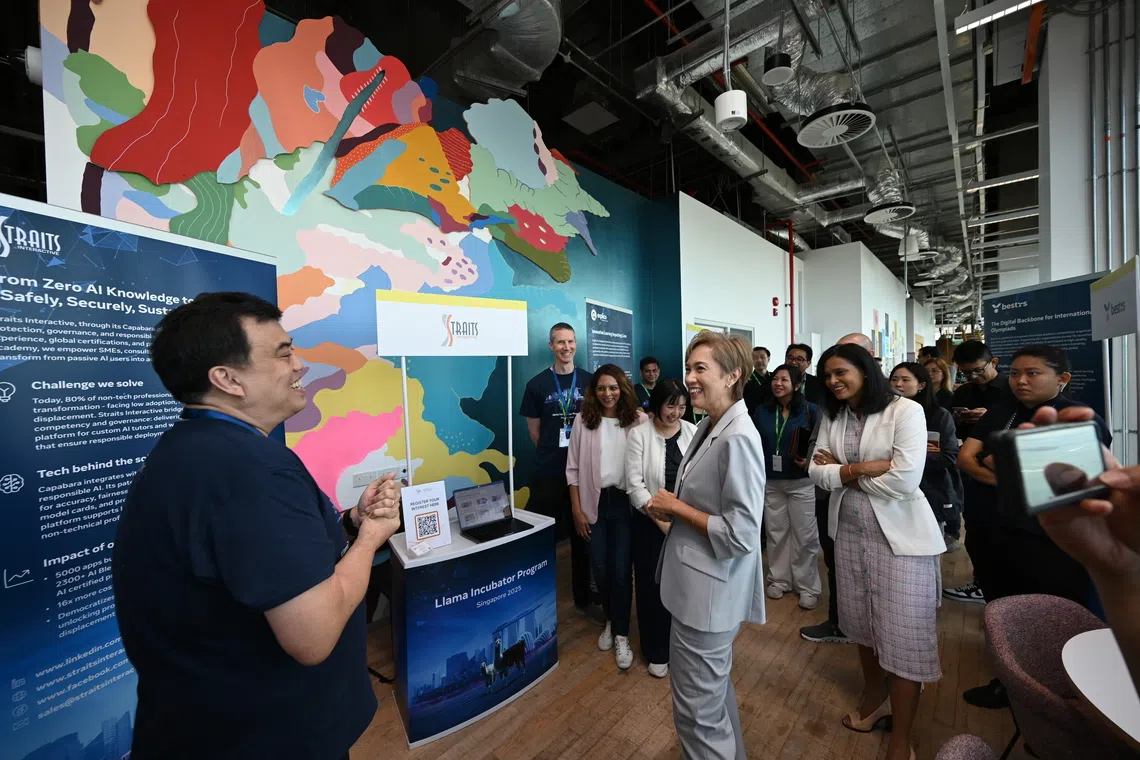Firm whose platform lets non-techies create AI apps among winners of Meta’s incubator programme
Sign up now: Get ST's newsletters delivered to your inbox

Digital Development and Information Minister Josephine Teo speaking to Straits Interactive's chief executive Kevin Shepherdson during the Meta Llama Incubator Program demonstration day on Oct 15.
PHOTO: COURTESY OF META
SINGAPORE – While creating artificial intelligence apps have long been viewed as an activity reserved for tech-savvy professionals, one company aims to change that by allowing anyone to do so just with a few clicks and natural language prompts.
Straits Interactive’s Capabara platform lets anyone create AI apps that can help to make their work more efficient or streamline operations. For instance, it can be used by teachers to create tutoring apps while consultants can create an app to practise their conversational skills.
The Singapore-based firm is one of three winners of tech giant Meta’s inaugural Llama Incubator Program, a six-month initiative that culminated in a demonstration day on Oct 15.
Out of 100 teams that applied, 40 start-ups, small and medium-sized companies and public sector teams in Singapore were selected to be provided with mentorship and technical resources to develop practical AI solutions, Meta said on Oct 15.
The programme was conducted in partnership with the Ministry of Digital Development and Information, Infocomm Media Development Authority, Government Technology Agency of Singapore and private organisations such as e27 and Deloitte.
A first for Meta within the Asia-Pacific region, the programme is done to support the growth of Singapore’s AI ecosystem, said Ms Sandhya Devanathan, the company’s vice-president of India and South-east Asia region.
Straits Interactive’s founder and chief executive Kevin Shepherdson said the firm’s win reinforces its mission of empowering non-technical professionals who may feel blindsided by the rapid advancements in technology.
Founded in 2013, the firm’s core business involves generative AI-enhanced training courses, software and consultancy services relating to data protection, digital transformation and AI governance.
“Our goal has always been to democratise the use of Gen AI, making it accessible to all, while ensuring that those who use the technology do so safely and responsibly,” Mr Shepherdson said.
While AI applications are widely used today, concerns remain around areas such as data privacy.
Capabara highlights such risks to users and provide recommendations on how to improve guard rails. For instance, creators may be prompted to display a warning to app users not to use sensitive personal information in chats.
The other two winners were local start-up CREX, which helps to translate sustainability data collected by hotels into trust certifications, and broadband provider MyRepublic, which created a tool that automates sales outreach and support. The three winners received $30,000 each in funding from Meta.
Democratising AI technology is aligned with the Government’s aim of developing “AI bilingualists”, noted Minister of Digital Development and Information Josephine Teo, who spoke at the Oct 15 demonstration day.
“AI specialists, such as data scientists and machine-learning engineers, get to do their best work when people with the domain and functional expertise bring their knowledge to the table,” she said.
In a manufacturing company, the data scientists and machine-learning engineers would be able to do a better job if the technicians are able to explain what has gone wrong with a machine, or why a specific process is producing too much wastage, she noted.
“For Straits Interactive, the idea that non-tech professionals have a lot to offer, and they should be helped to build an AI capability useful to the wider public, is a brilliant idea.”
As the country continues to push for AI adoption, some companies have stated that experimenting with AI does not produce worthwhile returns, said Mrs Teo.
She labelled these comments as “fair”, adding that thousands of AI bots have been built within the government as part of the experimentation process. “We know not all of them are magical. Quite a lot of them will turn out to be rather ‘meh’.”
Referring to how factories were not widely electrified until the 1920s, despite electricity – now deemed indispensible – being available from the late 1800s, she said: “Why did factories of the day take so long? Well, it’s because there are embedded systems.
“You need to work around them, and you need to try and find new breakthroughs at each juncture in order to make it come alive. I believe this will be the same for AI too.”



